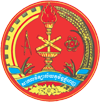Curriculum and Course Descriptions
Based on the results of the placement test they sit upon enrolment at RUPP, students are placed in one of the basic courses, English 001,101, 201/203 or 301/303. To fulfil the six-semester foreign language requirement, students placed in 001 will study ENG 001 through ENG 202. Students placed in 101 will study ENG 101 through ENG 302/304. Students placed in 201/203 will study ENG 201/203 through 302/304, plus two elective courses. Students placed in 301/303 will study that course, ENG 302, and four elective courses.
Basic Courses
ENG 101-102 (Elementary Level)
These courses are designed for students who enter the program with a minimal background in English. They study the elementary level of an integrated textbook series. Students who successfully complete ENG 102 are eligible to study ENG 201.
ENG 201-202/203-204 (Pre-Intermediate Level)
In these courses, students continue with the same integrated textbook series as in ENG 101-102 but at a pre-intermediate level. Graded readers are also used. Students who successfully complete ENG 202/204 are eligible to study ENG 301/303.
ENG 301-302/303--304 (Intermediate Level)
These are the last of the Basic Courses. In these two courses, students continue with the integrated textbook series. In addition, students are also introduced to academic reading and writing. Graded readers form an essential part of the curriculum.
Elective Courses
ENG 401-410 (upper-intermediate)
Students who place in ENG 201/203 or ENG 301/303 upon entering the University must subsequently take elective courses for the remainder of their degree. Elective courses are each one semester long. The elective courses presently offered are Academic Reading and Word List, English for Employment, Essay Writing, TOEFL Preparation, Methodology of English Teaching, Speaking Skills, South East Asia Studies, and Research Skills. Essay Writing is a prerequisite for Research Skills.
ENG401 Academic Reading
This course improves students’ reading skills, allowing them to read and analyze texts in their major area of study. The course textbook is Reading for a Reason. In addition, students intensively study academic word lists to help them understand the vocabulary of academic texts. These lists consist of the 570 most frequently used words in academic texts. The final exam consists of a reading text (50%) and a test of vocabulary from the lists (50%).
ENG402 English for Employment
This course develops students' English language proficiency in reading, writing, listening, and speaking by exploring situations and contexts related to business and the job market. Students practice their language skills by role play in a wide range of specific and general professional situations, such as participating in a job interview, preparing a CV or resume, filling out application forms, talking on the telephone, and writing formal and informal letters. In addition, students learn to plan ahead, and prepare for such situations.
ENG403 Speaking Skills
This course improves students’ fluency and pronunciation in spoken English. It also helps to develop critical thinking skills. Students learn how to lead a group discussion, how to reach a group agreement on a controversial issue, how to analyze a problem and how to evaluate possible solutions to that problem. In addition, in an important part of the course, students learn to prepare and deliver presentations, and each student makes at least three presentations during the semester, including a final speech of ten to twelve minutes in length. Finally, pronunciation exercises focus on sounds that are particularly difficult for native speakers of Khmer.
ENG404 Essay Writing
In this course, students learn to write five different types of academic essays: comparison-contrast, process, cause and effect, reaction, and argumentative essays. Students learn how to organize their essays by using the appropriate format, linking words and expressions. They also learn effective methods for planning, revising, and editing their work. Finally, students improve their grammar and develop their critical thinking skills. Note: Essay Writing is a prerequisite for Introduction to Research Skills and iBT TOEFL Preparation.
ENG405 Introduction to Research Skills (Semester II only)
In this course, students learn to write research essays based on information from books, newspapers, and the Internet. They learn how to take notes, paraphrase, and write summaries, and then use these notes to write guided reports. In addition, students write three major assignments based on interviews, questionnaires, and research in the field. Evaluation is based on written assignments, presentations, and class participation. Note: The elective course Essay Writing is a prerequisite for Introduction to Research Skills.
ENG406 Methodology of English Teaching (Semester II only)
This course is intended for students who teach English in their free time, or are planning to do so in the future. It outlines different techniques for teaching grammar, reading, writing, listening, and speaking to students studying English as a second or foreign language.
ENG407 iBT TOEFL Preparation (Semester II only)
This course prepares students for the new iBT (internet based test) TOEFL. Students examine the types of reading, listening, writing, and speaking questions which are assessed as part of the iBT TOEFL, and gain confidence in the test format. They also prepare for the international TOEFL test, which is needed to apply for scholarships overseas or for other professional purposes. Because iBT TOEFL is such a demanding test, only students with a high level of English proficiency should take this course. Note: The elective course Essay Writing or Academic Reading or South East Asia Studies is a prerequisite for iBT TOEFL Preparation.
ENG408 South East Asia Studies
This course will explore the differences and similarities between Cambodia and other nations in Southeast Asia and help understand why other nations have developed very quickly. The course will focus on examining differences in religions, politics, economies, history, and wars. The course will end with a role-play of an ASEAN conference in which students will have to act like representatives of different nations in Southeast Asia and try to persuade other nations to achieve the goals of their country.
Contact Info

N/A
Student Life

Foreign students who are interested in studying in Cambodia should first approach their national government. read more...
